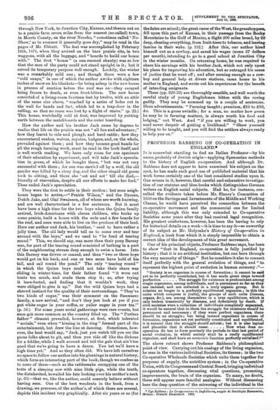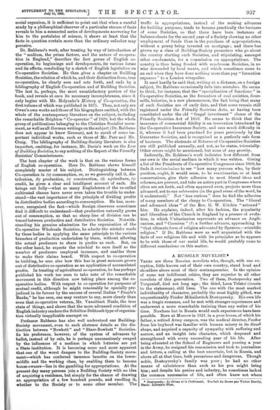PROFESSOR RABBENO ON CO-OPERATION IN ENGLAND.* IT is somewhat startling
to find an Italian Professor—by his name, probably of Jewish origin—applying Spencerian methods to the history of English co-operation. And. although Dr.
Rabbeno does not appear to have examined his subject on the spot, he has made such good use of published material that his work forms certainly one of the best considered studies upon it. One misses in it, however, that careful and exhaustive investiga- tion of our statutes and blue-books which distinguishes German writers on English social subjects. Had he, for instance, con- sulted the evidence taken before Mr. Slaney's Committee of 1850 on the Savings and Investments of the Middle and Working Classes, he would have perceived the connection between the co-operative movement and the commercial one for limited liability, although this was only extended to Co-operative Societies some years after they had received legal recognition. His greatest misfortune, however, has been the having to rely for historical details on a work—it is time to say it—so unworthy of its subject as Mr. Holyoake's History of Co-operation in. England, a book from which it is simply impossible to obtain a correct idea of the development of this great movement.
One of his principal objects, Professor Rabbeno says, has been to show "that in England, co-operation is fully justified by history ; that it is no artificial institution, but one born through the very necessity of things." Bathe considers it also to connect itself perfectly with the general evolution of things, and "to represent the highest point of evolution in human economy :"—
" Society is an organism in course of formation; it cannot be said yet to be perfectly constituted, but it has made great steps toward perfection The struggle for existence is predominant among single organisms, among individuals, and is permanent so far as they are isolated, and not collected in a truly organic group. But it subsists no longer in a perfectly equilibrated organism ; in this the units which compose it (cells), the groups of such units (tissues, organs, 8te.), are among themselves in a true equilibrium, which is only broken transiently by diseases, and definitively by death. If civil societies were a collection of individuals completely separated, it would be natural that in them the struggle for existence should be permanent and necessary ; if they were perfect organisms, there should be no struggle; but being instead organisms in coarse of formation, organisms not yet perfectly constituted and equilibrated, it is natural that the struggle should subsist ; bat it is also logical and plausible that it should cease Now what does co- operation do but to form precisely the prelude to that last period of social evolution, in which society shall be a really equilibrated organism, and shall have an economic function perfectly socialised P"
The above extract shows Professor Rabbeno's philosophical point of view. Carrying out his analogy of the living organism, he sees in the various individual Societies, its tissues ; in the two Co-operative Wholesale Societies which unite them together for purposes of supply, the nutritive system ; in the Co-operative Union, with its Congresses and Central Board, bringing individual co-operators together, discussing vital questions, promoting improvements, the brain of the organism. To many, no doubt, these will appear mere fanciful analogies. Without discussing here the deep question of the mirroring of the individual in the
tlgo Rabbeno La Co-operazicne in Inghaterra, saggio di SOCICAOgiti BC01101ftiCa. Milano; Fratelli Damolard. 1885.
social organism, it is sufficient to point out that when a careful study by a philosophical observer of a particular stream of facts reveals to him a connected series of developments answering for him to the postulates of science, it shows at least that the facts in question contain more than the ordinary onlooker may perceive.
Dr. Rabbeno's work, after treating by way of introduction of the "medium, the prime factors, and the nature of co-opera- tion in England," describes the first germs of English co- operation, its beginnings and developments, its various forms and its effects, concluding by a sketch of English legislation on Co-operative Societies. He then gives a chapter on Building Societies, the relation of which to, and their distinction from, true co-operation, he clearly sees and sets forth, and ends by a bibliography of English Co-operation and of Building Societies. The last is, perhaps, the most unsatisfactory portion of the book, and reveals at once its necessary incompleteness, since it only begins with Mr. Holyoake's Efistory of Co-operation, the first volume of which was published in 1875. Thus, not only are Owen's own works and those of his biographers omitted, with the whole of the contemporary literature on the subject, including the remarkable Brighton" Co-operator" of 1829, but the whole group of publications belonging to the Christian Socialist move- ment, as well as all German writings on the subject (Dr. Rabbeno does not appear to know German), not to speak of some im- portant individual works, such as those of Mr. Pare and Mr. Craig. The bibliography of Building-Society literature is also imperfect, omitting, for instance, Mr. Davis's work on the Law of Building Societies, to say nothing of the Report of the Friendly Societies' Commissioners.
The best chapter of the work is that on the various forms of English co-operation. Here Dr. Rabbeno shows himself completely master of his subject. Distinguishing between Co-operation in (a) consumption, or, as we generally call it, dis- tribution, (b) production, (c) construction, (a, agriculture, (e) credit, he gives a clear and intelligent account of each. He brings out fully—what so many Englishmen of the so-called cultivated classes have never even taken the trouble to under. stand—the vast importance of the principle of dividing profits in distributive bodies according to consumption. He has, more- over, recognised the fact—which foreign observers sometimes find it difficult to understand—that production naturally grows out of consumption, so that no sharp line of division can be traced between productive and distributive Societies. Notwith- standing his genuine admiration for the organisation of the Co-operative Wholesale Societies, he admits the mistake made by these bodies in applying the same principle to the various branches of production undertaken by them, without allowing the actual producers to share in profits as such. But, on the other hand, he expects the mischief to care itself as the
n umber of producers employed increases, and enables them to make their claims heard. With respect to co-operation in building, he sees also how this has in great measure grown .out of distributive co-operation as an application of accumulated profits. In treating of agricultural co-operation, he has perhaps published his work too soon to take note of the remarkable movement in this direction now taking place among the co- operative bodies. With respect to co-operation for purposes of mutual credit, although he might reasonably be specially pre- judiced in its favour by the success of several Italian "People's Banks," he has seen, one may venture to say, more clearly than even that co-operative veteran, Mr. Vansittart Neale, the true state of things, and shows that the more advanced condition of English industry renders the Schfiltze-Delitzsch type of organisa- tion virtually inapplicable amongst us.
Professor Rabbeno has also well understood our Building- Society movement, even to such abstruse details as the dis- tinction between "Bowkett" and " Starr-Bowkett " Societies. In his preference, however, of the system of advances by ballot, instead of by sale, he is perhaps unconsciously swayed by the influences of a medium in which lotteries are yet a State institution. It is becoming more and more apparent that one of the worst dangers to the Building-Society move- ment—which has conferred immense benefits on the lower- middle and the working class, by enabling them to become house-owners—lies in the gambling for appropriations. At the present day many persons join a Building Society with no idea of acquiring a residence, but simply for the chance of drawing an appropriation of a few hundred pounds, and reselling it, whether to the Society or to some other member. The traffic in appropriations, insteal of the making advances for building purposes, tends to become practically the business of some Societies, so that there have been instances of balance-sheets for the second year of a Society showing no other employment of funds than in the purchase of appropriations, without a penny being invested on mortgage ; and there has grown up a class of Building-Society promoters who go about the country starting such Societies, and stipulating, amongst other emoluments, for a commission on appropriations. The country is thus being flooded with mushroom Societies, in no wise demanded by local wants, and which sometimes come to an end when they have done nothing more than pay "formation expenses" to a London wirepuller.
It need hardly be said that, writing at a distance, on a foreign subject, Dr. Rabbeno occasionally falls into mistakes. He seems to think, for instance, that the "specialisation of functions" in Co-operative Societies, as the formation of coal societies, flour- mills, bakeries, is a new phenomenon, the fact being that many of such Societies are of early date, and that some remain still registered under the Friendly Societies Acts, as having been constituted under the old "frugal investment" clause of the Friendly Societies Act of 1850. He seems to think that the insurance of commercial fidelity is an innovation introduced by the Co-operative Insurance Society, and sees much difficulty in it, whereas it had been practised for years previously by the Guarantee Societies, and is recognised as a perfectly safe form of business. The abstracts of Returns of Co-operative Societies are still published annually, and not, as he states, triennially. Other errors might be mentioned, but none of any gravity.
Indirectly, Dr. Rabbeno's work indicates how different from our own is the social medium in which it was written. Giving a list of the Presidents of Co-operative Congresses since 1869, he finds it curiossissimo to see "how many persons who, by their position, ought, it would seem, to be reactionaries, or at least conservatives, give their adhesion to most liberal ideas and schemes, are present, and take an active part in Congresses where often are set forth, and often approved even, projects more than advanced, not to say subversive (in the good sense of the word, be it understood)." Not "less curious" does be find the adhesion of many members of the clergy to Co-operation. The "liberal and advanced ideas" of the Rev. G. W. Kitchin " astound " him. He explains, indeed, after his fashion, the popularity and liberalism of the Church in England by a process of evolu- tion, in which Unitarianism represents an advance on Angli- canism, and " Cosmism " (?) a further advance, approaching to "that ultimate form of religion advocated by Spencer,—scientific religion." If Dr. Rabbeno were as well acquainted with the facts of our religious life and with its principles as he appears to be with those of our social life, he would probably come to different conclusions on this matter.

















































 Previous page
Previous page